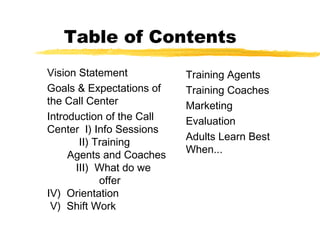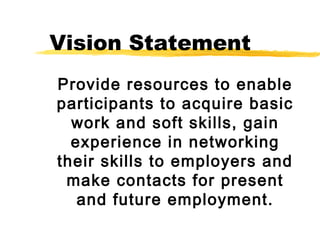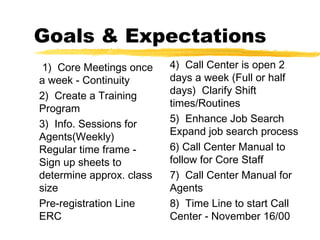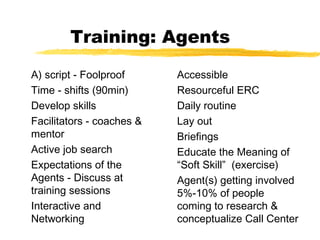call Center Framework
- 1. HEART Call Center Framework Nov 8,2000
- 2. Table of Contents Vision Statement Goals Expectations of the Call Center Introduction of the Call Center I) Info Sessions II) Training Agents and Coaches III) What do we offer IV) Orientation V) Shift Work Training Agents Training Coaches Marketing Evaluation Adults Learn Best When...
- 3. Vision Statement Provide resources to enable participants to acquire basic work and soft skills, gain experience in networking their skills to employers and make contacts for present and future employment.
- 4. Goals Expectations 1) Core Meetings once a week - Continuity 2) Create a Training Program 3) Info. Sessions for Agents(Weekly) Regular time frame - Sign up sheets to determine approx. class size Pre-registration Line ERC 4) Call Center is open 2 days a week (Full or half days) Clarify Shift times/Routines 5) Enhance Job Search Expand job search process 6) Call Center Manual to follow for Core Staff 7) Call Center Manual for Agents 8) Time Line to start Call Center - November 16/00
- 5. Training: Agents A) script - Foolproof Time - shifts (90min) Develop skills Facilitators - coaches mentor Active job search Expectations of the Agents - Discuss at training sessions Interactive and Networking Accessible Resourceful ERC Daily routine Lay out Briefings Educate the Meaning of “Soft Skill” (exercise) Agent(s) getting involved 5%-10% of people coming to research conceptualize Call Center
- 6. Training: Coaches File system Data base Coach “manual” Locked cabinets Trust and patience Language issues Developing procedures Evaluating standards Identify call lists - no repeat calls Problem resolution Troubleshooting Confidentiality Commitment Mock scripts, info. Session, briefings Design, implementation and delivery Info. Sessions Highlight training sketch
- 7. “Fears” Unknown Rejection Customer service abilities Acceptance Lack of confidence New career Risk Skills: organizational, communication, self-confidence, technology Change Training Experience Trust
- 8. Marketing Open house - Who is Attending? Meet Greet Reinforcing job search Flyers to employers (follow up) Phase Outline of “Who We Are” Vision Statement Friendly, Flexible and Approachable District Offices Employment Teams - related to workplace Placement Workers - Community Frontline Staff Community Centers T AR GETS
- 9. Evaluation Info. Sessions/Training Obtain outside source - Chris/ Durlop Evaluation Tool Core Staff
- 10. What Do We Offer? A) Our Skills Communication Networking Skills Presentation Skills Marketing Skills Info Sessions Training Development of professional attitude B) Boundaries recognize our strengths and limits working within the “ERC” Framework Resume writing and Training workshops already in place
- 11. Information Sessions 1) Agents Address Expectations Evaluation commitment - time frame Goals Pre-registration 2) Coaches One on one attention with agents Resume or in process (referral to workshop) Agenda and Goals
- 12. Adults Learn Best When... They are Pro-Active Learning meets current needs There is low stress There is a variety of learning modes effective tools Learning styles are considered Time is given to integrate information Past experiences are respected Learning focuses on skills and strategies Goals are achievable when they are realistic Modeling












